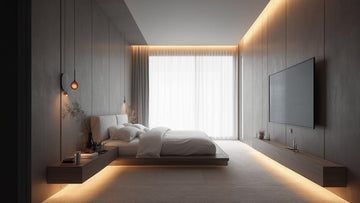Make your bedroom better for sleep by adding helpful technology alongside good design choices. Simple tools like sleep monitors, lights that turn on and off by themselves, and room controls can all work together through one central system to help you sleep better. Hide gadgets neatly and use wireless options that fit in with your calm bedroom setting. As bedrooms get smarter with new AI technology, they'll find more ways to improve your sleep naturally.
Key Takeaways
Smart bedrooms integrate sleep tracking devices and automated environmental controls to optimize rest through data-driven adjustments.
Concealed technology and wireless solutions maintain a peaceful aesthetic while providing modern sleep-enhancing functionality.
Smart lighting systems offer customizable schedules that support natural circadian rhythms and promote better sleep quality.
Central hub devices like Amazon Alexa coordinate multiple smart features, creating a cohesive and automated sleep environment.
AI-powered bedroom systems learn personal preferences and adapt room conditions automatically for personalized sleep experiences.
Essential Smart Technology for Better Sleep Quality
Sleep technology keeps getting better, and certain smart devices now help people sleep better.
Simple devices can track how you sleep, check your heartbeat, and watch your breathing, giving you a clear picture of your sleep patterns. This information helps you make better choices about your bedtime habits.
Special lights that match your body's natural sleep times can help you fall asleep and wake up naturally, while sound devices play soft background noises like rainfall or gentle hums to block out unwanted noise.
You can control these devices with your phone or connect them to your home's smart system to create the perfect sleeping space. Adding these helpful tools to your bedroom can turn it into a peaceful place for good sleep, just like many others have done.
Creating a Connected Bedroom Environment
A smart bedroom works best when everything connects to one main device that controls all your other gadgets. You can pick from Amazon Alexa, Google Home, or Apple HomeKit to run your bedroom setup.
Once you link your lights, temperature control, and window shades, you can set them to work together based on when you sleep.
Add sleep trackers to learn how well you rest each night. Your fitness band or smart bed can talk to your other devices and change your room as you sleep.
For example, if your tracker sees you're sleeping deeply, it can tell your room to get cooler and your shades to stay closed, helping you sleep better through the morning. When planning your bedroom layout for optimal technology integration, consider our guide on master bedroom layout.
Balancing Modern Tech With Restful Design
Modern tech can make bedroom more useful, but it shouldn't get in the way of making the room feel peaceful. You can keep tech simple by hiding devices in cabinets or picking smart items that look clean and simple.
Things like auto-control window shades that match your room's style, or smart lights that look like nice decor pieces work well.
Keep your tech items in specific spots away from where you sleep to keep rest and tech separate. Hide cords and wires neatly, and use wireless chargers built into bedside tables. For guidance on creating balanced bedroom spaces that accommodate both technology and tranquility, explore our article on designing a serene bedroom.
When buying smart devices, look for ones with small lights or lights you can dim. This way, you can use helpful technology while keeping your bedroom a quiet, peaceful place to rest.
Smart Lighting Systems and Sleep Enhancement
Light affects how well you sleep, and smart lights can help you get better rest by changing automatically throughout the day.
Modern smart bulbs work well with your daily schedule, slowly getting dimmer when it's time for bed and brighter when it's time to wake up.
Adding light therapy to your smart lights can help keep your sleep pattern on track. You can set your lights to give off bright, cool light when you need to be alert and soft, warm light in the evening. Understanding how lighting transforms your bedroom environment is crucial - learn more about lighting transforms bedroom furniture.
Many light systems come with ready-made settings that match your body's natural sleep cycle, and you can adjust how fast the lights change and how bright they get.
The Future of AI-Powered Sleep Spaces
In the coming years, smart bedrooms will change how we sleep and rest. Your bedroom will learn what you like, look at how you sleep, and make changes to help you rest better. These clever rooms will work smoothly with your daily life.
| AI Feature | Function | Benefit |
|---|---|---|
| Sleep Pattern Analysis | Tracks sleep cycles | Optimizes wake times |
| Environmental Learning | Monitors room conditions | Maintains ideal climate |
| Behavioral Adaptation | Studies daily habits | Adjusts personalized settings |
Your bedroom will work like a smart helper that knows what you need before you do. It will change the room temperature when you're in different sleep stages and adjust the lights to match your body's natural sleep timing. These smart systems will turn your bedroom into an advanced rest space that grows and changes as your sleep needs change. For those considering furniture that adapts to changing needs, our guide on evolving bedroom furniture offers valuable insights.
Frequently Asked Questions
How Much Does a Complete Smart Bedroom Setup Typically Cost?
Smart bedrooms can cost between $500 to over $5,000. Begin with basic items like smart lights and outlet plugs, then slowly add more expensive things like motorized window shades and devices that track your sleep.
Can Smart Bedroom Devices Still Work During Internet Outages?
Many bedroom smart devices keep working without internet by using Bluetooth or home networks, but you won't get all features and can't control them from far away during outages.
Are Electromagnetic Fields From Smart Devices Harmful While Sleeping?
Keep phones and tablets at least 3 feet away from your bed. While studies show few clear health risks, putting some space between you and your devices can help you sleep better and worry less.
Which Smart Bedroom Products Are Compatible With Rental Property Restrictions?
Smart curtains that clip on and come off easily, along with portable music speakers that connect to your phone, work great in rental homes since you can set them up without making holes and take them with you when you move.
How Long Do Smart Mattresses and Sleep Tracking Devices Usually Last?
Smart mattresses work well for about 6-8 years if you buy a good one. Sleep tracking devices typically run for 2-3 years. Taking good care of your devices and keeping their software up to date will help them work better and longer. For additional workspace integration in tech-enabled bedrooms, consider our guide on incorporating bedroom workspace.
Conclusion
Transform your bedroom into an intelligent sleep sanctuary by combining modern technology with beautifully crafted pieces from Timbur. Smart lighting, AI-powered climate control, and sleep-tracking technologies work seamlessly with our handmade furniture to create the perfect sleep environment. As smart home features advance, you'll discover new ways to enhance your bedroom's comfort and functionality. The key is finding the right balance between modern connectivity and peaceful tranquility - ensuring your tech-enhanced, furnished space remains focused on quality rest.









